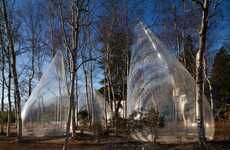Mexico's volcano-shaped stadium in Guadalajara city is a unique architecture to entertain the soccer fans in a sustainable way.
Conceived by French architects Jean-Marie Massaud and Daniel Pouzet, the exterior of the stadium has been designed to resemble a volcano and covered with greenary. To make the stadium more energy efficient, the stadium is capable of collecting rainwater that is used to water the pitch. Moreover, it has got some incredible green features such the white membrane resembling clouds and energy efficient lights and green parking spaces.
The 45,000 seating capacity volcano-shaped stadium was specially made for Mexico's popular soccer team 'The Chivas.'
Jean-Marie Massaud and Daniel Pouzet's stadium is a green way to promote sports without harming the eco system.
Volcano-Shaped Stadiums
Mexico Unveils Its New Sustainable Soccer Stadium
Trend Themes
1. Sustainable Architecture - The volcano-shaped stadium in Guadalajara demonstrates the trend of sustainable architecture, providing opportunities for incorporating eco-friendly features and designs in future construction projects.
2. Rainwater Harvesting - The stadium's rainwater collection system highlights the trend of rainwater harvesting, presenting opportunities for implementing water sustainability measures in various industries such as agriculture, landscaping, and construction.
3. Green Stadiums - The volcano-shaped stadium showcases the trend of green stadiums, offering opportunities for incorporating renewable energy sources, energy-efficient lighting, and sustainable practices in stadium construction and management.
Industry Implications
1. Architecture - The volcano-shaped stadium presents disruptive innovation opportunities in the architecture industry by inspiring the creation of sustainable, visually striking structures that blend with the natural environment.
2. Sports - The sustainable features of the stadium provide opportunities for disruptive innovation in the sports industry by encouraging the construction of eco-friendly stadiums, promoting environmental awareness, and attracting environmentally conscious athletes and fans.
3. Water Management - The rainwater collection system in the stadium creates opportunities for disruptive innovation in the water management industry, encouraging the adoption of rainwater harvesting systems in various settings to conserve water resources.




